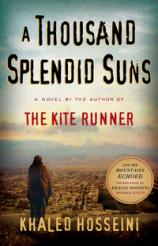A Thousand Splendid Suns
Review
A Thousand Splendid Suns
When a first novel sells more than four million copies in the United States and remains on the New York Times bestseller list for over two years, it's understandable that expectations for the author's second work will be high. Four years after the explosive success of THE KITE RUNNER, Khaled Hosseini returns with another novel set in his native Afghanistan, with even its cover art reminiscent of the earlier book. A THOUSAND SPLENDID SUNS contains many of the riveting elements that made its predecessor a volume that passed from person to person with the urging, "You've got to read this book." To that extent, it no doubt will please admirers of THE KITE RUNNER, but its intense focus on the plight of Afghanistan's women makes it a strikingly different work.
A THOUSAND SPLENDID SUNS tells the story of two Afghan women --- Mariam and Laila --- depicting their lives in the final quarter of the last century and the first few years of this one, as their country experiences two foreign invasions, civil strife, drought and famine. The two serve as proxies for the women of this troubled land, who have been victimized by most of those in power over that period, most notably the Taliban, whose religious fanaticism placed women in a status little better than that of slaves.
"A THOUSAND SPLENDID SUNS is an absorbing novel that is not afraid to tackle challenging subject matter in an intelligent and thoughtful way. For that reason alone, it deserves the wide audience it undoubtedly will secure."
Mariam, the elder of the two, is a harami, the illegitimate daughter of Jalil, a prosperous businessman from the city of Herat and one of his housekeepers. At the age of 15, her father arranges a marriage to Rasheed, a Kabul shoemaker. Although Rasheed quickly establishes his control over the young woman, their union is relatively placid until it becomes apparent after several miscarriages that she'll never bear Rasheed the son he covets. Rasheed's dominating behavior quickly escalates into constant verbal and physical abuse that brutalizes Mariam and ages her far beyond her years.
Laila is a Kabul native whose life intersects with Mariam's and Rasheed's after her parents are killed in a rocket attack as the family prepares to flee the country to join the growing body of Afghan refugees in Pakistan in the early 1990s. When the couple comes to her aid, she's approximately the same age as Mariam at the time of her marriage to Rasheed, and it appears their efforts are motivated by genuine concern for the young woman. Soon, however, it becomes clear that Rasheed sees in her the opportunity to create the family he was unable to have with Mariam, and he weds Laila and brings her into the household.
Laila bears Rasheed two children, while she and Mariam live at first in a wary relationship under the increasingly tyrannical domination of their husband. In some of the book's most lyrical passages, Hosseini portrays Laila's effort to break through the wall of resentment that distances Mariam from her. When she does, the women unite in a profoundly moving way to face their common enemy.
Khaled Hosseini is a classical storyteller who has clearly demonstrated his talent for crafting tales whose effective, if occasionally melodramatic, plotting and compulsive readability seduce readers --- especially those with scant knowledge of their exotic setting --- from the first page. In this case, he brings those talents to bear to expose the persistent subjugation of women that has marred much of modern Afghan history. At the same time, his determination to make that case contributes to what may be the novel's only notable flaw: the relative lack of complexity in the portrayal of its main characters. Mariam and Laila consistently display saint-like fortitude and courage in enduring almost lifelong persecution. Rasheed is so irredeemably evil it's hard to endure him for the length of time he serves as the novel's dominant male character. A greater degree of subtlety in sketching these characters would have made A THOUSAND SPLENDID SUNS an even more impressive work.
Near the end of the novel, Laila reflects that "every Afghan story is marked by death and loss and unimaginable grief." With ongoing combat, a flourishing drug trade and even fears of a resurgent Taliban, if Khaled Hosseini chooses to maintain his focus on the tragic story of the Afghan people, one senses he won't run out of compelling material anytime soon. A THOUSAND SPLENDID SUNS is an absorbing novel that is not afraid to tackle challenging subject matter in an intelligent and thoughtful way. For that reason alone, it deserves the wide audience it undoubtedly will secure.
Reviewed by Harvey Freedenberg([email protected]) on February 24, 2011
A Thousand Splendid Suns
- Publication Date: May 22, 2007
- Genres: Fiction
- Hardcover: 372 pages
- Publisher: Riverhead
- ISBN-10: 1594489505
- ISBN-13: 9781594489501










